Have you ever heard of an elevator pitch? Yes, you’re probably thinking of a Shark Tank where people win million dollar deals.
True, and when we talk about your personal statement, it is also an elevator pitch for your audience (admission officers, hiring managers) etc.
For a scholarship or an internship with your dream company, you need to make an impact in college.
The Scholarship America Foundation estimates that 58% of scholarships go unawarded yearly due to unqualified or generic applications.
Your personal statement is your actual story. And, if you want to learn how to write a memorable personal statement, you can head over to this blog.
But, in this guide, you’ll explore different types of personal statements, strategies and powerful AI tools to write a statement that sounds authentically you.
Personal statements are not just written on the page anymore.
More schools and employers now ask for video pitches or recorded answers, which means your spoken responses also need to sound original and true to you.
If you are using AI tools to experiment with scripts or audio, our Undetectable AI’s AI Voice Detector can help you check how authentic that speech sounds.
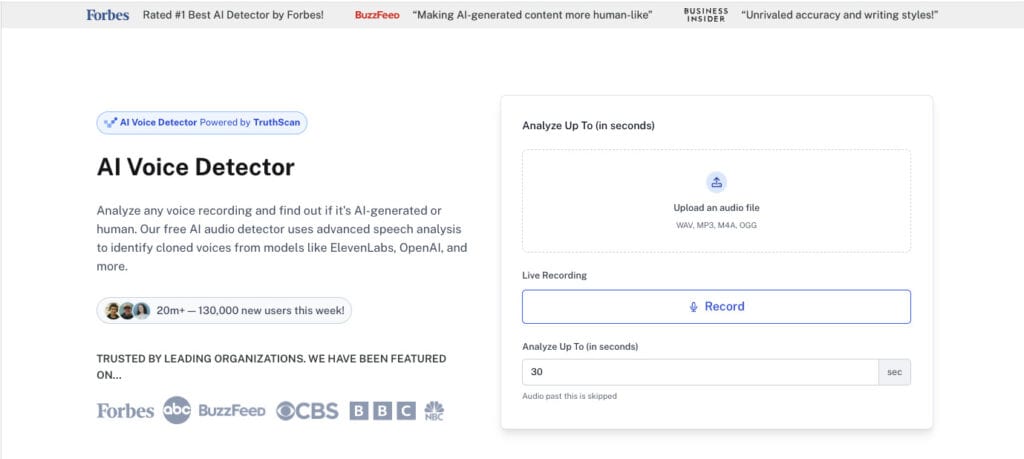
You can upload a clip, see whether it shows signs of AI generation, and use that feedback to keep your applications anchored in your real voice.
Table of Contents
Key Elements of A Strong Personal Statement
Now before we’ll see the examples, let’s build the foundation of a strong personal statement.
- Strong Narrative/Story
So, you’re not writing a bland essay here. To make your story unignorable, think of it like a movie.
Because people love movies.


Never Worry About AI Detecting Your Texts Again. Undetectable AI Can Help You:
- Make your AI assisted writing appear human-like.
- Bypass all major AI detection tools with just one click.
- Use AI safely and confidently in school and work.
Here’s what most people do:
“I love biology. I did an internship and I want to be a doctor”.
Here’s how to do it:
“I’ve spent 417 hours studying a single painting. Not because I love art—because it’s a forgery, and I can prove it.”
- Strong Hook
You need to grab their attention in the first attempt. Don’t wait for it.
The more strong your hook is, the greater the impact is.
Bad: I’m honored to apply.
Good: Technically, I’ve been a CEO since age 12—when I started selling stolen Wi-Fi passwords to my middle school classmates.
- “Why You” Factor
Imagine two candidates:
Candidate A says, “I’m passionate about renewable energy.”
Candidate B explained: “After building a solar-powered water filter for my village in Kenya, I saw how energy access can rewrite a community’s future.”
Be Candidate B.
- Be Concise
You need to cut the fluff. Every sentence must pass the “So What” test?
Fluffy says: “I’m a hard worker who thrives in collaborative environments.”
Impactful: “I rebuilt a 1997 Jeep Cherokee with four strangers from Reddit.” We now have a YouTube channel that teaches others how to restore cars without ego.”
Personal Statement Examples You Can Take Inspiration From
- Academic Examples
Undergraduate Admissions for STEM Field
“I still remember the first space vehicle I designed. In my sixth grade year at [redacted] Elementary School, my teacher, Mrs. [redacted], asked our class to sketch a picture of what the space shuttle would look like if we had designed it. I drew mine to have trays of ice underneath the rocket engines because I wanted to make sure they didn’t overheat. Since then I have decided to dedicate my life to spacecraft design. I hope to pursue a PhD in Aeronautics and Astronautics at [redacted] University so that I can make this dream a reality.
In graduate school I would like to be involved in research on space propulsion. Professor [redacted]’s research on measuring the electron density of steady-state plasmas is of special interest to me and I would hope to work with her as a graduate student at Purdue. The experience I continue to gain with my Fulbright project of studying Laser-Induced Fluorescence of Xenon plasmas to determine the nuclear cross sections of certain transitions will be very useful for my future research. My major in Applied Physics will also provide a strong basis for this research, and for more advanced study of space propulsion. The Applied Physics major at [redacted] College was designed to prepare students for careers or further study in engineering or related fields. I have taken many physics courses including Modern Physics, Thermal Physics, Circuits and Electronics I and II, as well as numerous math courses including Partial Differential Equations.
Humans have always been curious about what lies just beyond our reach and we keep finding ways to push a little further to learn more. One way I have done this in my life is through integrating research with education. In my Industrial Physics class, we learned about the magnetic levitation train and my professor told us that he had the materials to make a model if anyone was interested. Even though I had no idea how to build it, I indicated that I was interested in undertaking such a project. During my junior year, he guided me through the designing and building stages and, even though I did not finish it that year, this year I decided to assume more ownership of it and make it the basis of my senior thesis. This opportunity to take something that I had learned in class and to make it the subject of a substantial project has been an experience that has solidified my interest in research. The combination of education and research has led me to a deeper knowledge of science that would not have been possible with just one of these elements.
Since childhood, I have been fascinated by space and what it might hold. Therefore, I wish to dedicate my life to furthering the exploration as well as our understanding of space. I hope to pursue a PhD in Aeronautics and Astronautics at [redacted] University in preparation for a career in electric space propulsion so that I might achieve this goal.”
This personal statement clearly shows the passion of a candidate applying for STEM.
Graduate School Application for Humanities
“I went to the same high school as James Agee, and when I was seventeen, I relived The Morning Watch. With a few friends, I kept vigil in the Lady Chapel, kneeling before the spring flowers collected illicitly from the yards of neighbors. Just before sunrise, we left the chapel and went out into the still darkness. We walked along the old railroad path through the woods until we came to the Sand Cut, and we jumped in—it was as cold as Agee had promised. Shivering, euphoric, I returned to campus and attended my first period class, my hair still wet from the Ageean baptism.
At that time in my life, I showed my passion for literature through imitation. I wanted to recreate the narratives that were significant to me, to praise them through replication. Then, as an undergraduate at [redacted] College, I found more complex connections in texts through analysis rather than simple imitation. I studied writers like Margaret Atwood, M.F.K Fisher, and Tennessee Williams through a variety of critical lenses. I concentrated on gender studies and drama, particularly in 20th– and 21st-century American texts, and I completed coursework in literary criticism, 20th-century drama, fiction, poetry, and playwriting.
Since graduation, my career in the fine arts has further refined my literary interests. From working on August Wilson’s 20th-century cycle of plays at the [redacted] Center for the Performing Arts, to promoting new productions like Next to Normal and Looped at [redacted] Stage, to publicizing VSA commissions from playwrights and performers with disabilities, I’ve experienced the vibrancy and relevance of the arts today; not only are new works being created, but familiar texts are constantly being interpreted and re-told. I no longer want only to replicate literature or dissect it: I want to participate in the ongoing literary discussion.
From my work in theater and disability, I’ve developed an interest in adaptation—adapting novels to plays and adapting environments to suit physical capabilities. For example, one possible study that interests me is how Carson McCullers’ fiction translates to the stage and the relationship between her personal experience with disability and her fictional portrayal of disability. Another is how James Agee’s work in film differs from his fiction and how his experience as a Southerner in the early 20th century informed his work. I’d like to explore how individuals adapt to society, in texts like Flannery O’Connor’s The Violent Bear It Away and William Faulkner’s Light in August, as well as how individuals adapt to their landscapes, whether it’s a thriving relationship in Willa Cather’s My Ántonia or a debilitating one in Cormac McCarthy’s The Road. The landscape can change the rhythm, the tone, the very syntax of the work. The land and the body, the set and the characters—these are the elements of literature that intrigue me.
It’s both humbling and empowering to assert that I deserve to be part of your program. Since both my mother and sister received their doctorates from [redacted] (in chemistry and medicine, respectively), I’ve long been aware of what an exceptional university this is. [redacted] boasts an impressive faculty, and I am most interested in studying under Dr. [redacted], Dr. [redacted], and Dr. [redacted], since, as this essay makes apparent, I’m drawn to Southern literature. It would be an honor to learn from Dr. [redacted], whose scholarship on Southern writers from H.L Mencken to William Faulkner has distinguished him in the field. I admire Dr. [redacted]’s blending of history, biography, and geography to create a full representation of a literary genre, and I would love to learn more about gender and queer theory with Dr. [redacted], who writes fascinating analyses of sexual politics. [Redacted] has strengths in my key areas of interest, and I’m eager to pursue the best possible training as a scholar and teacher.
My goal is to become an educator. My experience as a middle school English teacher revealed to me that I enjoy teaching as much as I have always enjoyed learning. I am equally engaged in the solitary work of literature, the reading, writing, revising, and researching, and the social elements of education, the collaborating, challenging, discussing, and informing. I aspire to engage fully in academic life, in both my relationships with texts and my relationships with faculty and students. If I can leave you with one thought, it’s this: I am completely invested in this work. I want to study diligently and earnestly, and then I want to share that knowledge. I’m ready to jump in.”
This personal statement received an offer of admission from a top 15 program.
- Professional Examples
Career Change Personal Statement
“I’m Joshua Lee, and I hope to become the next Junior Web Developer at your organization. Before learning to code, I spent the first five years of my career as a social media manager, helping brands create engaging digital content that reached their targeted demographic. While my recent training through a coding boot camp taught me to read and write programming languages, I could also bring creativity and analytical skills to the job.
“Social media taught me to understand my audience intimately, which informs my approach to development. I create intuitive sites that prioritize user experience and engaging visuals. I am eager to infuse brand personality into your sites, collaborate with other developers, programmers and testers and improve the functionality of existing pages.”
This personal statement shows how a candidate wants to switch his career from social media management to web development.
Industry Specific Examples (Healthcare)
“This morning I helped present a Strategic Plan for a new venture to the executive committee for the [redacted] Health System. I am a Business Analyst for [redacted], and financial and data analysis make up the largest parts of my responsibilities. I am versed in financial analysis and planning, and I am currently responsible for integrating several databases into the larger [redacted] data structure, increasing our health care system’s access to meaningful patient and financial data. I enjoy many aspects of my job, and I currently am in the place I want to be, doing what I want to do. My interest in further education has everything to do with where I want to go from here.
My current position affords me an understanding of the health care system from a managerial perspective, however, my past experiences continue to drive my curiosity about the ways in which health care functions globally, and the ways in which we can use this knowledge to improve access to care and health outcomes. Three years ago, I had the opportunity to travel Southeast Asia for about six months. While in rural Indonesia my friend, Jeff, contracted an aggressive strain of pseudomonas bacteria in his right eye – characterized by rapid progression – and needed to be treated immediately. The iris had clouded over, and the doctor at the local hospital informed us that his cornea was becoming “like the cheese with the holes.”
Jeff eventually made a full recovery, but in this situation, others would have been at serious risk of blindness or death. According to the physician who treated Jeff, many Indonesians who contract this type of pseudomonas lose the affected eye and sometimes parts of their face, due to physical and financial accessibility barriers to health care. For Jeff, on that day and in that place, those barriers were low. Jeff was able to travel to find care, and the cost of living worked in his favor; his total bill came to $24 USD. Others in Indonesia, and many in the United States, face barriers which discourage them from seeking care that would otherwise improve and extend their lives.
I have witnessed similar issues of access in many of the countries that I have visited. Last summer I spent some time at an orphanage in the Dominican Republic where a friend had been volunteering for the year. While there I got to know a volunteer physician who was personally struggling with resource allocation and her sense of beneficence. She was caught between the stated goals of the organization (to care for the kids) and the obvious needs that fell outside those goals (the overwhelming poverty in the surrounding communities.) The ramifications of conflicts such as this one become more apparent in situations of scarcity, increasing the importance of thoughtful allocation when viewed from a public health perspective – a theoretical statement that I watched unfold in real life as cholera, and panic, began to spread out of Haiti and into the Dominican Republic. Personal, community, economic, and even ethical conflicts make these decisions complex. Organizational values do not always align with what individual actors believe to be best for the health of the public. This conflict interests me, and is one that I would like to explore further academically.
While investigating my path into Public Health, I met with Dr. [redacted] to discuss my varied interests. We discussed the importance and development of Edge organizations to meet the demands of healthcare reform and the analysis of patient outcomes and quality as a reimbursement model. The areas of interest that I’ve not yet been able to explore in my professional life, but that have grown from my study and travel abroad are access to clean water, access to care, disaster management, and resource allocation. I hope to one day be able to pursue these in my professional life, and pursuing them academically will best prepare me to achieve that goal.
I believe that [redacted] is the best place for me to explore my academic interests in Public Health. I do not yet know exactly where I would like to end up, but I do know I will use the principles I learn to guide my career to contributing to the health of the public – whether it continues to be in the analysis of data to examine patient outcomes, or whether it ends up being more hands on, such as increasing access to potable water.”
This personal statement gained admittance to a top School of Public Health — the only program to which the applicant applied.
- Creative Examples
Personal Statement for Creative Program (Art, Writing, Film)
“Writing gives me the freedom to create a world where I set the rules, where the characters act the way I want them to, a world where everything is exactly how I want it to be and I know that I am the one who controls everything. Given the fact that I live in a country where consistency is a bad joke and no one can tell what the next day will bring, this feeling of absolute control brings a sense of balance in my life and motivates me to persevere.
As a writer, I focus solely on prose; I began writing in Greek at a young age, taking part in a variety of competitions and I received a commendation from Kathimerini newspaper at the age of thirteen in their 2002 contest for young writers. I switched to English when I was accepted at the English language and literature programme of the Kapodistrian University of Athens. I find that writing in a foreign language, namely English, gives me a sense of freedom my mother tongue never did. Though I once aspired to become a film director, viewing writing as a hobby, I came to realise that words and not images were meant to be the medium I would use to introduce what’s inside me to the world. I’ve been writing seriously for the past couple of years and I’m now working on the second draft of my novel, while a story of mine was recently featured in Litro magazine.
I’m quite taken with books that centre on the complexities of family relations and dynamics, the juxtaposition of the characters standing alone and the way they function within the family web. Eugenides’s Middlesex is my favourite book and a great source of inspiration for my work, as I, too, focus on family sagas, with themes like gender, power struggles, revenge and the relations within different households concerning me most. However, I usually employ a much different setting: I’ve been told I have a talent for “world weaving” and a wild imagination to boot, with the majority of my stories dedicated to the multiverse theory, looking up to the works of great English authors Clive Barker and Neil Gaiman.
My mother is a professor of Ancient Greek, so I was raised with the great Greek tragedies, making it my mission to read them all; I think it’s only natural that I developed an interest in the theme of the tragic hero and the quadriptych of ates – hubris – tisis – nemesis. I particularly enjoy the first act because I believe it mirrors our everyday lives: arrogance, youth and foolishness blinds the protagonist who overreaches, showing total disregard for all limits. His actions are his undoing, seen in ancient Greek mythology in the form of divine retribution, until he bitterly regrets his hubris, completing the tragic cycle with the loss of something he held dear. The timeless and brilliant plays of Aeschylus, Sophocles and Euripides combined with Greek mythology have taught me much and I believe them to be some of the most complex and compelling stories ever told.
It intrigues me how much power the first person narrative has over the reader, no matter what the character’s qualities are. Books like Salinger’s Catcher in the Rye, Burgess’s Clockwork Orange and Ellis’s American Psycho introduce characters that range from unlikable to plain psychopathic and they are the reason I find this point of view fascinating, employing it in the majority of my work, as they have helped me realize you don’t have to like a character to love him.
Since 2011 I’ve been teaching Greek and English literature during the summer months as part of a voluntary work programme; I’ve travelled extensively and I’ve been fortunate enough to have spent quite some time outside the Greek borders. I believe that teaching as well as my work as a translator, an occupation I thoroughly enjoy, has enriched my vocabulary and deepened my knowledge of the English language. I look forward to the challenge this degree will pose for me; I’m sure this course will be a deeply fulfilling experience, as I wish to develop my skills as a writer and build confidence in my abilities through sharing my work with others. I know this University will offer me the chance to explore possibilities I would never be able to unless I was accepted in this programme.”
This personal statement was written by Odile to show interest in creative programs.
Storytelling Personal Statement
“I was still high off the competition, poring over ballots by the soft streetlights as we drove. “Are you sure you want to do this?” My Dad was worried about me. Worried about my world crashing down around me, losing friends, being crushed by hate. Scarred by controversy. I laughed it off, and we rode in silence.
Forgive the melodrama: this is a story about being a dissident in an authoritarian regime, but it’s a fun story. From 12 years old, I grew up in the NCFCA—the National Christian Forensics and Communication Association, a homeschool speech and debate league. My friends and I joked that the only difference between fascist Italy and the NCFCA is that in Italy, things at least ran on time. But this is how my political awakening began: a summer debate camp in [Date] that my parents sent me to because I “always argued.” I was hooked.
Politically, the NCFCA is conservative. Not totally homogenous, but Christian and homeschooled. At the same time I was learning debate—how to think—in that context, my Dad and I started watching The Daily Show with Jon Stewart and talking about its subjects. This duality was key: as I developed my own, left-leaning views, I was surrounded by very smart people who disagreed with me. I had instant access to the best arguments against my beliefs—instant access to the best tools to refine them. Beyond that, though, it imparted empathy: seeing a wide range of views held by people that I liked and respected (and still do) made me want to understand. I loved it.
Fast forward to my second or third year in the league. I wanted to have some fun. I emailed the regional coordinator, asking if there’s a rule against a speech advocating for same-sex marriage.
The answer? “No, but people wouldn’t like it.” That was fine. That was the point.
Why make a persuasive speech if everyone already agrees with you? The first draft of the speech was straightforward: establish the separation of church and state, then outline the secular arguments for gay marriage. Watching everything from disgust to bemusement play across my club members’ faces as I gave the speech, hearing the note of concern that didn’t quite mask the edge creeping into the critique, I tried again. I built a theological argument, established common ground with my audience, and I was going to persuade them. I never got the chance. A couple months before competition season began, we were pulled aside at the club. The hushed tones, the guarded expressions—the room was heavy with quiet, administrative displeasure. It wasn’t a two-sided conversation. They told me two things: I couldn’t give the speech in club (because controversy has no place in a debate club!), and the national leadership decided my speech didn’t reflect a Biblical worldview. Meaning? Banned speech.
After writing a flurry of ultimately ineffective emails, I did a speech on why we should embrace theological diversity. That speech wasn’t fueled by spite—though I do enjoy the irony of its birth, and I sarcastically named the word document “HERESY.” Rather, I wanted to make a point. Christian Abolitionism, the Nicene Creed, the doctrine of the Trinity: all once hotly debated products of dissent, iron sharpening iron. Of history’s 40,000+ competing theologies, why assume that you’ve come along and finally gotten the Bible right? I didn’t do well with this speech, but I still won: because I am unbroken—not scarred, but emboldened. I saw intolerance, but I also see hope. To this day, some of my closest friendships are built upon discussions of theology and politics, iron on iron, punctuated by laughter. Hope lives in that laughter, because as it dances between us, it brings with it empathy and wisdom.”
This personal statement shows genuine personality with strong storytelling.
- Miscellaneous Examples
Scholarship Personal Statement
“If you can’t live off of it, it is useless.” My parents were talking about ice skating: my passion. I started skating as a ten-year-old in Spain, admiring how difficulty and grace intertwine to create beautiful programs, but no one imagined I would still be on the ice seven years and one country later. Even more unimaginable was the thought that ice skating might become one of the most useful parts of my life.
I was born in Mexico to two Spanish speakers; thus, Spanish was my first language. We then moved to Spain when I was six, before finally arriving in California around my thirteenth birthday. Each change introduced countless challenges, but the hardest part of moving to America, for me, was learning English. Laminated index cards, color-coded and full of vocabulary, became part of my daily life. As someone who loves to engage in a conversation, it was very hard to feel as if my tongue was cut off. Only at the ice rink could I be myself; the feeling of the cold rink breeze embracing me, the ripping sound of blades touching the ice, even the occasional ice burning my skin as I fell—these were my few constants. I did not need to worry about mispronouncing “axel” as “aksal.” Rather, I just needed to glide and deliver the jump.
From its good-natured bruise-counting competitions to its culture of hard work and perseverance, ice skating provided the nurturing environment that made my other challenges worthwhile. Knowing that each moment on the ice represented a financial sacrifice for my family, I cherished every second I got. Often this meant waking up every morning at 4 a.m. to practice what I had learned in my few precious minutes of coaching. It meant assisting in group lessons to earn extra skating time and taking my conditioning off-ice by joining my high school varsity running teams. Even as I began to make friends and lose my fear of speaking, the rink was my sanctuary. Eventually, however, the only way to keep improving was to pay for more coaching, which my family could not afford. And so I started tutoring Spanish.
Now, the biggest passion of my life is supported by my most natural ability. I have had over thirty Spanish students, ranging in age from three to forty and spanning many ethnic backgrounds. I currently work with fifteen students each week, each with different needs and ways of learning. Drawing on my own experiences as both a second language-learner and a figure skater, I assign personal, interactive exercises, make jokes to keep my students’ mindset positive, and never give away right answers. When I first started learning my axel jump, my coach told me I would have to fall at least 500 times (about a year of falls!) in order to land it. Likewise, I have my students embrace every detail of a mistake until they can begin to recognize new errors when they see them. I encourage them to expand their horizons and take pride in preparing them for new interactions and opportunities.
Although I agree that I will never live off of ice skating, the education and skills I have gained from it have opened countless doors. Ice skating has given me the resilience, work ethic, and inspiration to develop as a teacher and an English speaker. It has improved my academic performance by teaching me rhythm, health, and routine. It also reminds me that a passion does not have to produce money in order for it to hold immense value. Ceramics, for instance, challenges me to experiment with the messy and unexpected. While painting reminds me to be adventurous and patient with my forms of self-expression. I don’t know yet what I will live off of from day to day as I mature; however, the skills my passions have provided me are life-long and irreplaceable.”
This personal statement is strong enough to impress the officers to get a scholarship.
Personal Statement for Volunteer Programs
“I was born in a small city of CITY which is located in a province of PROVINCE in China. I spent my childhood there being a happy and careless child until the age of 9. Around this time, the factory my father was working at was closed and all the agreements with employees were terminated. With each day it became harder for my dad to feed our family of NUMBER people. We were forced to move all over the region due to my dad’s work. I could not stand looking how my parents were working 60 hours per week in order to provide us at least with some welfare. I used every opportunity to work at least part time to help my parents support the family. Eventually, we felt that we could not take this any longer. Due to the complicated situation in the country my parents were forced to move to the United States looking for a better future for me and my family. It was an extremely tough decision to make since we had to leave all our past behind and start a brand new page of our lives in an unknown, foreign country. However, despite of this decision being the hardest our father have ever made, it was definitely the right one. For our family, United States meant much more than a mere monitory prosperity. We were seeking for freedom. We have been living in the Port Angeles, Washington, ever since 2009.
It was quite easy for my dad to find a job since he had a vast experience in engineering since his employment at the factory in China and we started to live a decent life quite quickly. I got enrolled in the high school which I enjoyed visiting a lot. All my classmates were friendly and open-minded which made it easier for me to adjust to the new environment. It was at my school where I realized I enjoyed organizing and planning different event. So I decided to take an active part in my school’s social life. I was the head of the organizing committee of most of our school fairs and festivals. My biggest achievement was organizing a food festival dedicated to Thanksgiving Day. I was managing more than 30 people who were involved in different activities including the PR of the event and involvement of the participants. It was one of those experiences which made me realize that I truly enjoy organizing and planning and, according to the feedback we received after the festival, I was quite good at managing projects. So when I was graduating from high school in 2011 I knew exactly what I want skills I want to obtain in life – human management.
Since my parents were fully employed, there was no need for me to work part-time any longer. However, I did enjoy working part-time in China since it was where I gained my most valuable experiences and knowledge and met different people of many backgrounds. Thanks to the financial prosperity and independence, I could finally dedicate my free time to what I enjoyed the most – volunteering. I decided to spend a few years volunteering in different projects and challenging my dream to become a project manager one day. I was volunteering at a local food bank where I was in charge of testing the quality of the food and its further delivery to different non-profit organizations. I was also in charge of the big events where we organized a feast of those in need dedicated to Thanksgiving Day, Christmas, New Year and Independence Day. Each event reminded of my school years. Even now I think this job was one of the most fulfilling ones in my career even though it was not paid.
While working as a volunteer, I was also employed at Safeway where I have worked for almost 4 years ever since the last year of high school. It helped me develop my communication skills since I was mostly involved in the customer support center. As customer support representative, I dealt with as many different situations as there are customers in the company. I learnt how to deal with different types of people as well as managing various crises. I also used to work at Starbucks during my summer holidays back at high school. Thanks to my part-time jobs I learnt how to be independent quite quickly and did not need my parent’s financial support any longer unlike my classmates. I do not think being dependant from your parents is a bad thing, but it definitely makes the transition to adulthood much more complicated.
My lifetime goal is still quite shocking for my parents. I want to establish a non-profit organization in my home town in China. I do believe that women can achieve no less than men and I am ready to prove it. However, in order to achieve my dream I need so much knowledge and experience to gain. Therefore, I decided to apply for the BAS program in Peninsula College since I am convinced that education provided by this college will definitely make me successful in what I am planning to do. I have decided to join a multi-national company in order to have an opportunity to work with people of different backgrounds and mentalities and gain enough in order to manage my own organization. I have some practical knowledge of managing small events but I have always felt that I lack a lot of knowledge I can only gain at Peninsula College. I understand that HR management is definitely not enough to manage an organization successfully. Therefore, I would like to gain more knowledge in accounting, strategic management and economics since I consider those to be essential for any top manager. I always try my best in everything I do and this time is not an exception. I do believe that our cooperation can be beneficial for both sides.
There are so many things you can dedicate your life to. Some people choose family, the others – sports. I know I have not chosen the easiest wave to take but I know for sure – this one is mine.”
This personal statement clearly shows the interest of a candidate like yours.
How To Start a Personal Statement – Examples
Let’s be real:
Your opening line is your only shot to make readers care.
Admissions committees skim thousands of essays—a weak start lands you in the “Maybe Later” pile (aka the trash).
Most personal statements start like a snoozy voicemail: “Hi, I’m Jane. I’m applying because…”
This doesn’t work.
Here’s how to start your own personal statement.
- Strategy 1
Bad start:
“From a young age, I wanted to help people.”
Why they fail: They’re vague, overused, and forgettable.
Winning formula:
Example:
“The first law I ever broke was at 14—hacking into my school’s database to change my bullied friend’s lunch schedule. Today, I want to protect systems, not exploit them. That’s why cybersecurity isn’t just a career for me—it’s a redemption arc.”
Dissect why this works:
1. “First law I ever broke” → Intrigue (Wait, what?!)
2. “Hacking… to change my friend’s schedule” → Vulnerability (Moral complexity)
3. “Cybersecurity… redemption arc” → Direction (Clear purpose)
- Strategy 2
Admissions committees read 1,000+ essays about “passion,” “making a difference,” and “sparkling journeys.”
Be the exception.
Rewrite clichés with specificity:
- ❌ “I’m passionate about environmental justice.”
- ✅ “I track air quality in Delhi like a weatherman—except my forecasts come with DIY filter blueprints.”
How to do it:
- Identify your most generic sentence.
- Ask: “What’s the weirdest/most vivid example of this?”
- Replace the abstraction with that scene.
How Does a Mission Statement Differ from Personal Statement?
A mission statement declares what you stand for in broad, aspirational terms.
A personal statement is your own personal story – how you have lived those values through your life experiences.
| Mission Statement | Personal Statement |
| “To empower underserved communities through accessible tech education.” | “Teaching coding to teens revealed a truth: education isn’t just about skills—it’s about dignity. Now I build apps that turn ‘I can’t’ into ‘I coded this.’” |
| Purpose: To inspire others | Purpose: Prove you’re the right fit. |
Why the difference matters:
- Admissions committees don’t care about your ideals—they care about your proof.
- A mission statement says, “This is what I believe.” A personal statement says, “Here’s how I’ve earned the right to believe it.”
How to Start a Personal Statement for Grad Schools
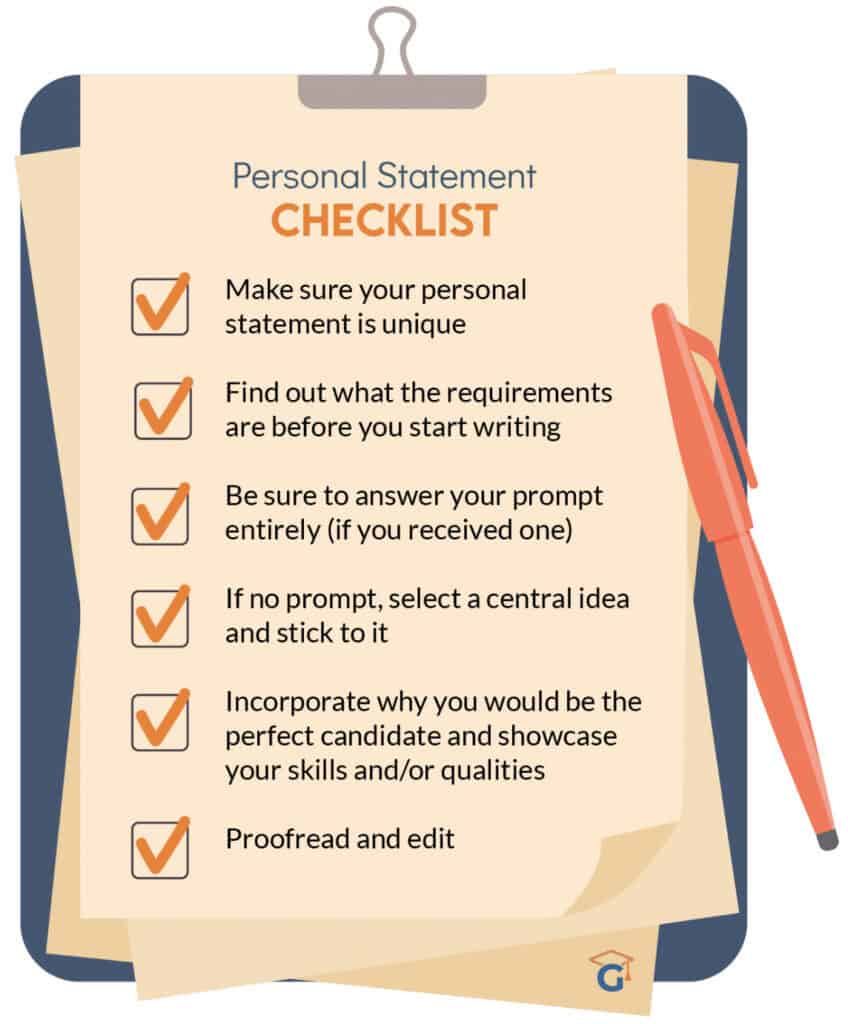
Source: gradschools.com
Starting a grad school personal statement can feel overwhelming, but it doesn’t have to be.
Here’s a breakdown:
Opening Strategies for Grad School
- Focus on a Specific Problem
- Example:
“Many AI models struggle to work in remote areas. During my internship, I designed a simpler system for farmers with no internet. Your program’s focus on rural tech is why I’m applying.” - Why it works: Shows you’ve identified a real issue and see how the school can help.
- Example:
- Share a “Lightbulb Moment”
- Example (Psychology):
“I used to believe that anxiety was just a mental condition. Working with homeless teenagers taught me that it is also important to have safe housing. Now I want to investigate how the environment influences mental wellness.” - Why it works: Shows growth and curiosity.
- Example (Psychology):
- Connect Your Work to the Program
- Example (Engineering):
“My senior project reduced factory pollution by 15%. I want to join your lab to learn how to scale this for bigger industries.” - Why it works: Proves you’ve done homework on the program.
- Example (Engineering):
Dos and Don’ts
DO:
- Start with a clear example from your experience.
- Mention a professor or class you want to work with.
- Use simple, direct language.
DON’T:
- Use vague phrases like “I’ve always loved science.”
- Talk about childhood dreams (e.g., “Since I was 5…”).
- Overload with technical terms.
Easy Formula to Follow
- Problem: What issue have you worked on?
“Most solar panels don’t work in cloudy climates.” - Your Work: What did you do about it?
“I built a low-cost model that stores 30% more energy on cloudy days.” - Why This Program: How does the school fit in?
“Your renewable energy lab’s work on storage solutions matches my goals.”
Tips for Using Personal Statement Examples
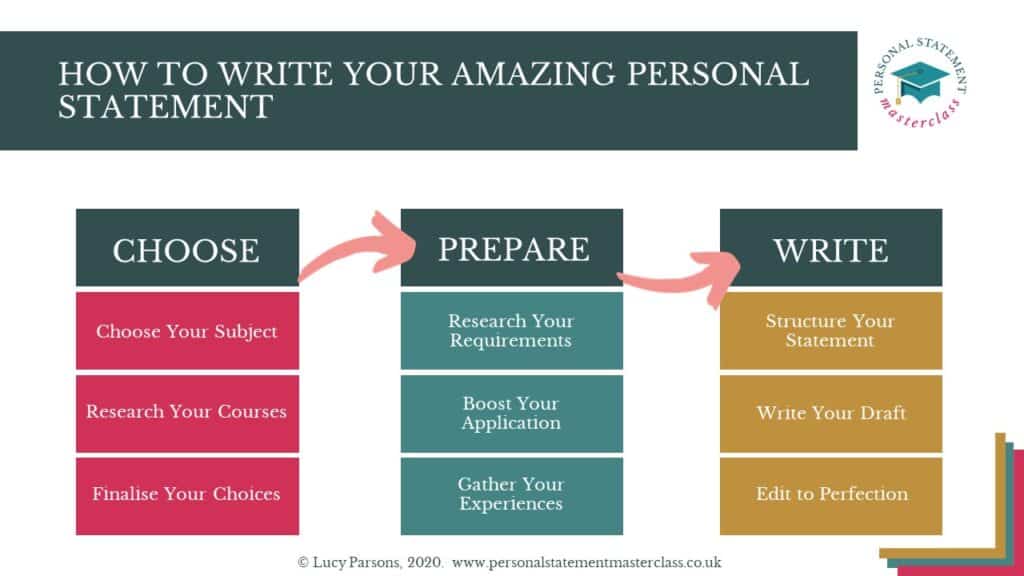
Source: EduBirdie
- Adapt Examples To Your Own Story
Example You Like:
“Volunteering at a food bank taught me that hunger isn’t about food—it’s about dignity.”
Bad Adaptation (Too Similar):
“Volunteering at a shelter taught me homelessness isn’t about houses—it’s about respect.”
Good Adaptation:
“At the community garden, I realized fresh veggies won’t fix food deserts—but teaching kids to grow their own kale might.”
How to Do It:
- Replace their activity with your own (food bank → community garden).
- Replace their lesson with your unique take (dignity → empowerment).
If you find a sample essay that captures the structure you like but doesn’t quite match your tone, you can utilize our Undetectable AI’s Sentence Rewriter to customize and polish personal statement examples so they perfectly reflect your individual voice.
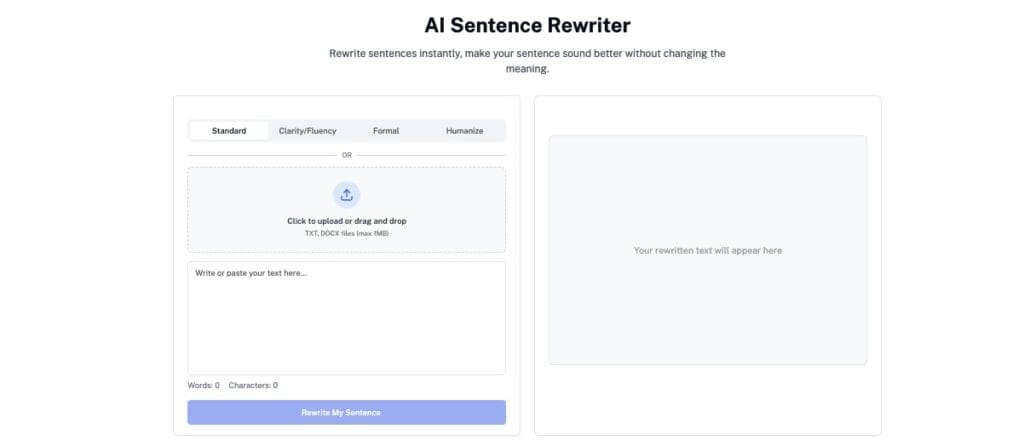
You can use AI Humanizer by Undetectable AI to rephrase your tone/voice. Try it in the widget below!
You can also use Paraphrasing tool by Undetectable AI to swap the words and sentences by keeping the core idea.
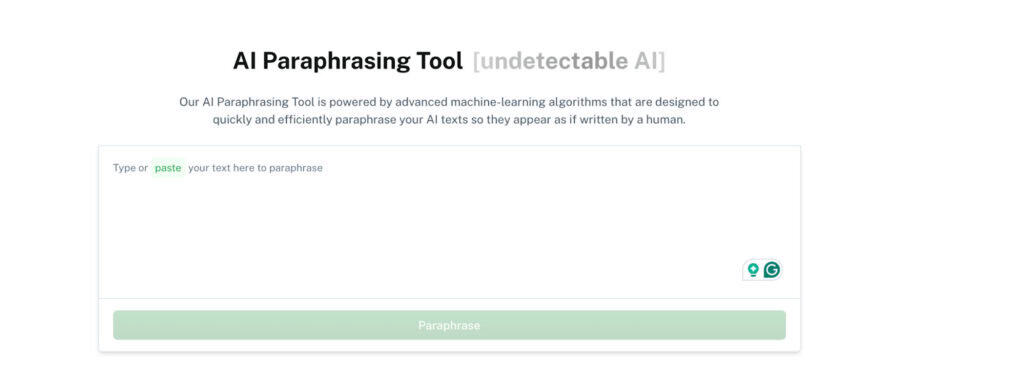
- Balancing Inspiration With Originality
Problem: You love a sample essay’s structure but don’t want to copy it.
Solution:
- Original Example Structure:
Hook → Challenge → Lesson → Goal - Your Version Using AI Stealth Writer:
“I trained AI to detect fake news (hook). But when it flagged my mom’s WhatsApp forwards, she banned my laptop (challenge). Now I build tools that educate, not alienate (lesson). Your program’s ethics focus will help me fix what I broke (goal).”
You can use AI Stealth Writer by Undetectable AI to sound original and creative.
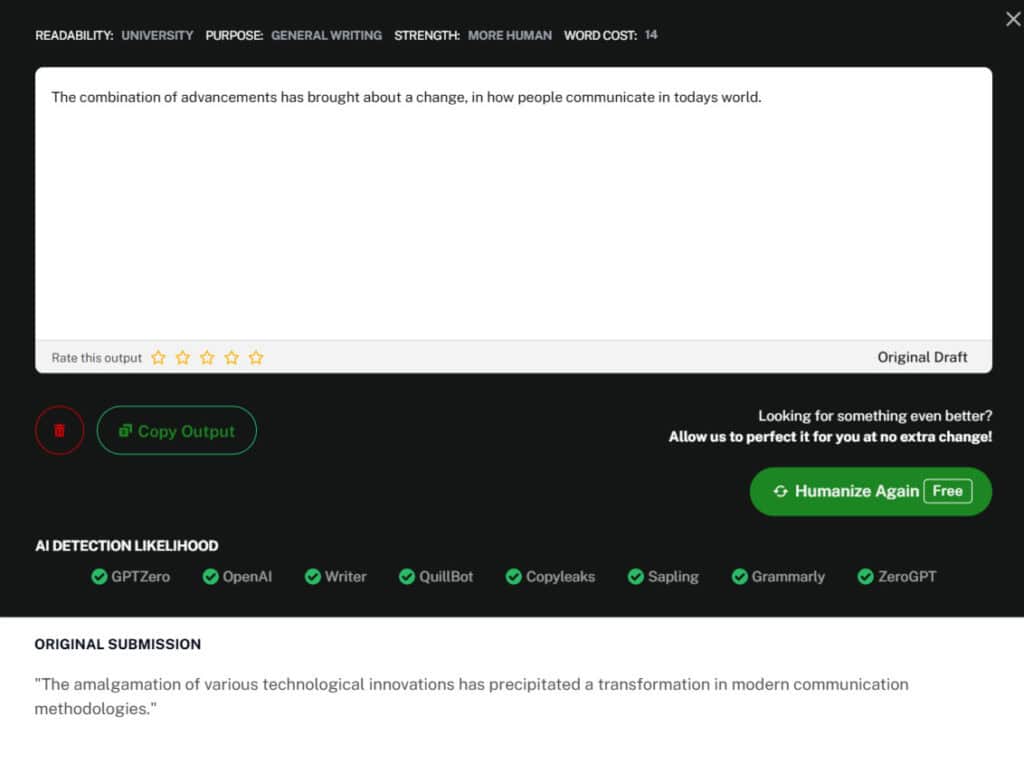
- Personalizing Templates
You can use AI Essay Writer by Undetectable AI to generate more personalized versions of your life experiences.
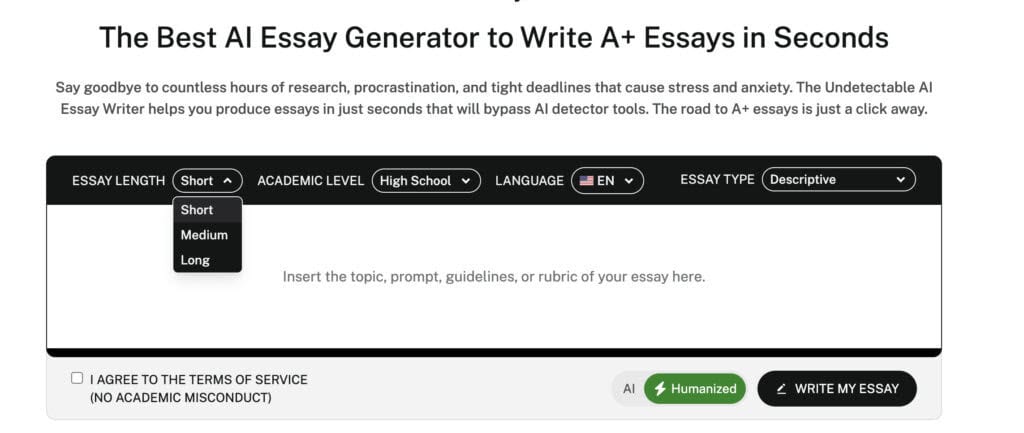
PRO TIP: This storytelling cheat sheet will help you to write your own engaging, and effective personal statement.
- Personalizing Prompts and Statements
You can use AI Question Solver by Undetectable AI to instantly generate clear, personalized responses to common personal statement questions.
Whether you’re tackling prompts like “Why do you want to pursue this field?” or “What makes you a strong candidate?”, just type in your context or experience, and the tool will help you shape a thoughtful, well-structured answer.
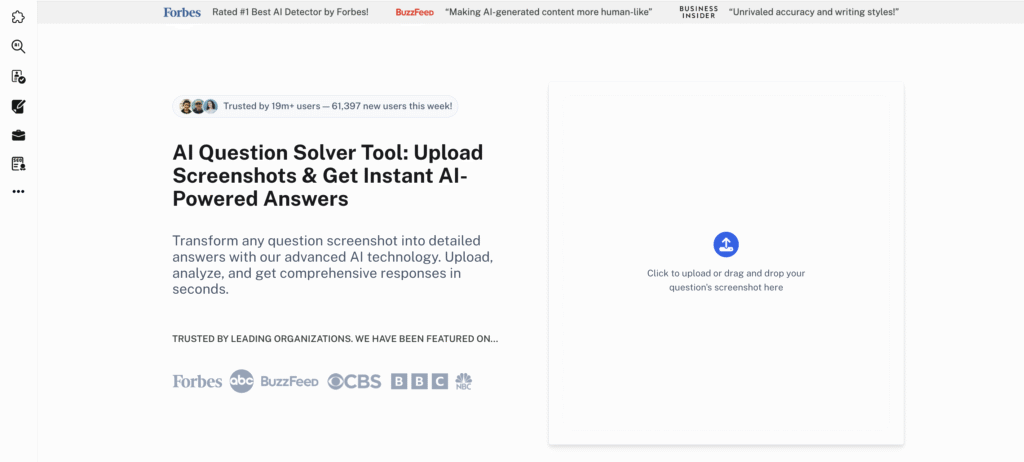
PRO TIP: Use AI Question Solver to break down vague application prompts into specific ideas. It’s like having a brainstorming partner that responds in seconds.
FAQs
What makes a personal statement stand out?
Your personal statement would stand out and grab the attention of admission officers if it is authentic, unique and well-structured.
Can I use the sample statement for multiple applications?
No, it’s better to modify your personal statement based on the specific requirements. You can reuse 10-20% (e.g., core stories or skills), but tailor 80% to each program.
How long should a personal statement be?
Undergrad: 500-700 words (1-2 pages).
Grad School: 800-1,000 words (2-3 pages).
Scholarships/Jobs: Follow guidelines strictly—some want 250 words max.
Final Thoughts
Your personal statement isn’t just a document—it’s your story’s spotlight moment. The opening scene of your hero’s journey.
Don’t just write it—own it.
- Be bold: Would you keep reading after your first sentence?
- Be human: Flaws make you relatable; triumphs make you unforgettable.
- Be magnetic: Why should they care?
Polish your draft with our Word & Sentence Counter—trim the fluff, keep the magic, and stay within limits without losing your voice.
